《经典翻译赏析》word版
经典翻译赏析(一)——单句篇4

赏析:“a deputy-maternal attitude”实在不好译,而张谷若 先生的“俨然以‘老姐比母’自居”却译得那么轻松自然, 准确得当,让人不由得不叹服。吕叔湘先生也有一译,与此 译有异曲同工之妙:Now and then he turned his eyes from the girl's face to that of the partner, which, in exhilaration of the dance,had taken on a look of impudent ownership.他 时而转移他的目光从女子的脸上到她的舞伴的脸上,那张脸 在跳舞的狂热之中俨然有“佳人属我”的神情。
9. Oh, we are proud! (George Bernard Shaw: Pygmalion)
译文:吓,好大架子。(杨宪益译)
赏析:翻译对话,要生动活泼。日常生活中,人们常用的 一些词语、表达方式,大多具有生动活泼的特点,翻译中, 如何充分利用这些有声有色的语言,是一门学问。杨宪益 先生细揣摩说话人的心理,用生动活泼的汉语口语来译原 文,得到的译文“信”、“达”且“切”。
译 她文母:亲她的母病亲已已好经转见,好不,用不她用时她刻时在刻跟在前病伺床候前了伺,候囚了在,病她房 在 里病这房些里 日和子病,人有缠空了出这来么散些散天心,,一她旦当跑然到很外高面兴地了里。,当然 很高兴。(张谷若译)
赏析:先译“her mother’s improvement”,接着译“she was not now required'’,再译“after the confinement of the sick chamber”和“doing it",最后译“she liked”, 翻译顺序是从后依次向前,可谓之倒拆法(“从形式看,[倒 拆]就是按意群把句子拆散,逆着原文的句法排列,逐片往上 倒译”,黄邦杰《译艺谭》,第133页),这样译出来的文 字因是因,果是果,符合汉语的行文顺序。此外,“见好”、 改“译缠:”等词的选择也非常精当。
经典短篇文言文翻译及赏析

经典短篇文言文翻译及赏析经典短篇文言文翻译及赏析在现实学习生活中,我们最不陌生的就是文言文了吧?文言文是中国文化的瑰宝,古人为我们留下了大量的文言文。
相信很多人都在为看懂文言文发愁,下面是小编为大家收集的经典短篇文言文翻译及赏析,欢迎大家分享。
经典短篇文言文翻译及赏析1鱼我所欲也孟子及其弟子〔先秦〕鱼,我所欲也;熊掌,亦我所欲也。
二者不可得兼,舍鱼而取熊掌者也。
生,亦我所欲也;义,亦我所欲也。
二者不可得兼,舍生而取义者也。
生亦我所欲,所欲有甚于生者,故不为苟得也;死亦我所恶,所恶有甚于死者,故患有所不辟也。
如使人之所欲莫甚于生,则凡可以得生者何不用也?使人之所恶莫甚于死者,则凡可以辟患者何不为也?由是则生而有不用也,由是则可以辟患而有不为也。
是故所欲有甚于生者,所恶有甚于死者。
非独贤者有是心也,人皆有之,贤者能勿丧耳。
一箪食,一豆羹,得之则生,弗得则死。
呼尔而与之,行道之人弗受;蹴尔而与之,乞人不屑也。
万钟则不辩礼义而受之,万钟于我何加焉!为宫室之美、妻妾之奉、所识穷乏者得我与?乡为身死而不受,今为宫室之美为之;乡为身死而不受,今为妻妾之奉为之;乡为身死而不受,今为所识穷乏者得我而为之:是亦不可以已乎?此之谓失其本心。
(与通欤;乡通向;辟通避)译文鱼是我所想要的,熊掌也是我所想要的,如果这两种东西不能同时得到,那么我就只好放弃鱼而选取熊掌了。
生命是我所想要的,道义也是我所想要的,如果这两样东西不能同时都具有的话,那么我就只好牺牲生命而选取道义了。
生命是我所想要的,但我所想要的还有比生命更重要的东西,所以我不做苟且偷生的事。
死亡是我所厌恶的,但我所厌恶的还有超过死亡的事,因此有灾祸我也不躲避。
如果人们所想要的东西没有能比生命更重要的.,那么凡是能够用来求得生存的手段,哪一样不可以采用呢?如果人们所厌恶的事情没有超过死亡的,那么凡是可以躲避祸患的办法什么不可以做呢?采用某种手段就能够活命,可是有的人却不肯采用;采用某种办法就能够躲避灾祸,可是有的人也不肯采用。
经典翻译赏析(一)——单句篇7
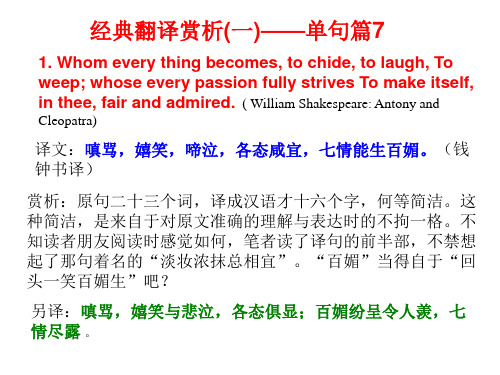
10. “Did you say 'pig' or„fig‟?”said the cat.
(“I said 'pig”‟, replied Alice.)
译文:“你刚才是说‘猪’还是‘鼠’?”(赵元任译)
赏析:“pig”和“fig”发音相似,“the cat”才可能没 听清。既然“pig”译成了 “猪”,“fig”也必须译成一 个与“猪”在发音上类似的汉字。译者大胆地舍弃“fig” 的本意“无花果”,挑选了个“鼠”字,同“猪”字声母相 似,韵母相同,这样一来,译文从逻辑上就说得过去了。从 这个译例里也许可以得出这样的结论:译文当然要忠实于原 文,但译者不应被原文束缚手脚,很多时候大胆创造是必要 的。
11. A quick brain and a better education elsewhere showed the boy very soon that his grandsire was a dullard; and he began accordingly to command him and to look down upon him.(William Thackeray: Vanity Fair)
经典翻译赏析(一)——单句篇7
1. Whom every thing becomes, to chide, to laugh, To weep; whose every passion fully strives To make itself, in thee, fair and admired. ( William Shakespeare: Antony and
13. A quick brain and a better education elsewhere showed the boy very soon that his grandsire was a dullard; and he began accordingly to command him and to look down upon him.(William Thackeray: Vanity Fair) 译文:那孩子脑子快,在别处受过好教育,过了不久就发 现爷爷足个蠢东西,因此看不起他,把他呼来喝去。(杨 必译) 赏析:一个已臻“化境”的译例。结构上的精妙调整,显示 了译者翻译技巧运用之纯熟,原句带有淡淡的幽默,译句选 词也致力于传达这种淡淡的幽默,所选“呼来喝去”、“蠢 东西”词语准确、形象,富有调侃意味,与整句乃至句子所 在的整个篇章的风格相吻合。
经典翻译赏析(1)

经典翻译赏析(1)经典翻译赏析(一)——单句篇2一、单句Kissinger felt the massive bombing would strengthen the President's hand in China.2. That Home is Home though it is never so Homely.3. A particular fine spring came round, and the stir of germination was almost audible in the buds.(Thomas Hardy: Tess of the d’Urbervilles)4. Thus the initiative to partition Poland completely, to deny the Polish people any independent existence of their own whatsoever, came from the Russians. But the Germans did not need much urging to agree.5. “If only I know how the young men nowadays are changing,” (P.G. Wodehouse: When the Doctors Dispute)6. His discourse, says Speidel, “became lost in fantastic digressions.”7. Chilly gusts of wind with a taste of rain in them had well nigh dispeopled the streets.8. Only let us be thankful that the darlings are like the beasts of the field, and don't know their own power. They would overcome us entirely if they did. ( William Thackeray: Vanity Fair)9. Every family is said to have at least one skeleton in the cupboard.10. If you think me in a way to be happier than I deserve, I am quite of your opinion11. No greater misfortune can be fall a country than to be governed by an old tyrant.12. Hearing Debs was an experience.13. Charity begins at home, they say.(Thomas Hardy: Tess of the d’Urbervilles)14. The large cities absorb the wealth and fashion of the nation.二、段落1. Girl: Don't you remember me? Verdoux: Ah, yes, yes. How's the world treating you? Girl: Hah…I could complain, but l won't. What I need is a good manager. Do you know anybody that wants a job? (Mr. Verdoux, directed by Charlie Chaplin)译文:拉塞妮:还记得我吗? 凡尔利:啊,记得,记得。
经典英译汉文章翻译赏析
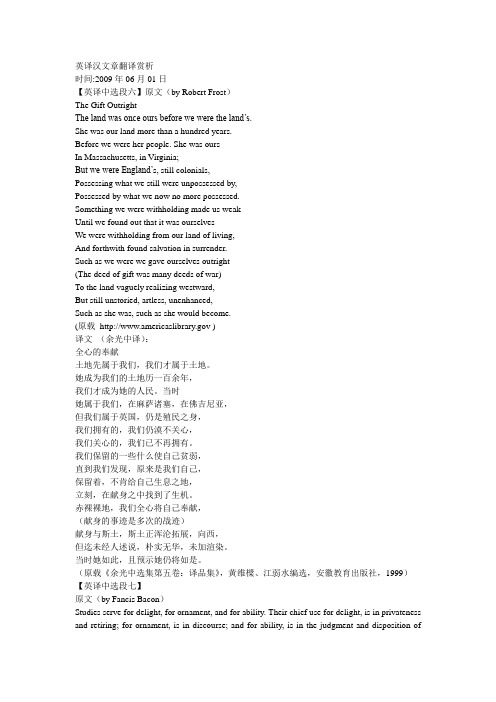
英译汉文章翻译赏析时间:2009年06月01日【英译中选段六】原文(by Robert Frost)The Gift OutrightThe land was once ours before we were the land’s.She was our land more than a hundred years.Before we were her people. She was oursIn Massachusetts, in Virginia;But we were England’s, still colonials,Possessing what we still were unpossessed by,Possessed by what we now no more possessed.Something we were withholding made us weakUntil we found out that it was ourselvesWe were withholding from our land of living,And forthwith found salvation in surrender.Such as we were we gave ourselves outright(The deed of gift was many deeds of war)To the land vaguely realizing westward,But still unstoried, artless, unenhanced,Such as she was, such as she would become.(原载 )译文(余光中译):全心的奉献土地先属于我们,我们才属于土地。
她成为我们的土地历一百余年,我们才成为她的人民。
当时她属于我们,在麻萨诸塞,在佛吉尼亚,但我们属于英国,仍是殖民之身,我们拥有的,我们仍漠不关心,我们关心的,我们已不再拥有。
经典翻译赏析(一)——单句篇5

2. My sweet, clever, attractive, economical, sensible little girl, free at last. 译文:我那性子又好、又聪明、又好看、又会当家、又识 大体的女儿,这可自由了。(吕叔湘译) 赏析:吕先生的这句译文是翻译界公认的佳译。译句几乎是 顺着原句逐词直译的,原句分两个句段,前长后短,译句也 分两个句段,前长后短,传达了原文形的美(句子前长后短, 象征了说话人经过了很长时间的期待,终于看到女儿自由了, 迫不及待地与外人道的欣喜)。原句中几个词也译得很不落 窠臼:“sweet”译为“性子好”(用在这里似乎没有此这 更恰当的了),“economical”译为“会当家”, “sensible”译为“识大体”,都是精雕细凿的结果。 另译:我那性子好、又聪明、又好看、 又懂事、又会过日 子的小女儿,终于自由了。(吕叔湘译)
8. Not a soul passed that way for a long while, and the faint notes of the band were the only human sounds audible within the rim of blue hills. (Thomas Hardy: Tess of the d'Urbervilles) 译文:那条路上,许久没再过一个人影儿。在青山环绕的 山谷里,那轻渺的铜管乐声,就是惟一能听到的人籁。 (张谷若译) 赏析:在拥挤、嘈杂、吵闹的都市里每天为不绝的噪音折磨 得寝食难安,读到这样的描写,您是否有一点点心动? 另译:路上久久不见人影,青山廓里传来的幽幽管乐声算是 唯一能听到的人为之音。
经典翻译赏析(一)——单句篇5
1. He was sixty-five, his hair was grey, his face lined and there were pouches under his eyes, but he bore his years gallantly.(W.S. Maugham: The Razor's Edge) 译文:他六十五,头发花白,皱纹满面,眼下边两个肿眼 泡,但是他不服老。 赏析:将抽象的“he bore his years gallantly”译成 具体的“他不服老”,可谓简洁明了,读来痛快。 改译:他已六十有五,一头白发,满脸皱纹,泪囊鼓起, 还就是不服老。
经典翻译赏析一-单句篇
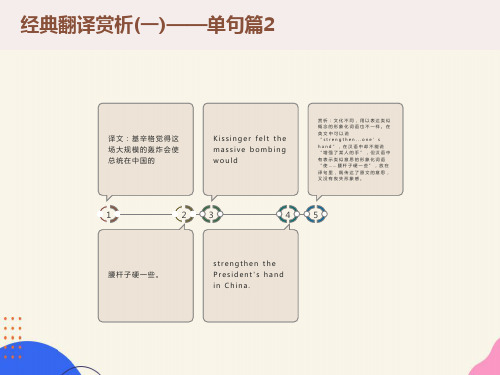
13. Charity begins at home, they say. (Thomas Hardy: Tess of the d’Urbervilles)
译文:人家不是说,行善得由已及人吗? (张谷若译)
译文:基辛格觉得这场大规模的Fra bibliotek炸会使总统在中国的
Kissinger felt the massive bombing would
赏析:文化不同,用以表达类似概念的形象化词语也不一样。在英文中可以说“strengthen...one’s hand”,在汉语中却不能说“增强了某人的手”,但汉语中有表示类似意思的形象化词语“使……腰杆子硬一些”,放在译句里,既传达了原文的意思,又没有丧失形象感。
译文:国之横祸,莫过于暴君当政。
赏析:现代汉语是在古汉语的基础上发展起来的,相对于现代汉语来说,古汉语有它自己的优势,如词汇丰富、语法有弹性、表情表意能力强等等,在写作和翻译时,适当地运用一些古汉语的语素或词,能给文章带来一种书卷气,显得庄重典雅。上面这个译例就体现了这种特色,译者灵活套用了古汉语的句子结构,使用了古汉语的个别语素(词语),译出的句子简洁、庄重,读来好似看见了一个学识渊博的老学究在摇头晃脑地评说历史。
改译:常言道:家丑家家有,羞于外人道。
10. If you think me in a way to be happier than I deserve, I am quite of your opinion
译文:如果你认为我的幸福来之太易,得之有愧,那我完全同意你的看法。 ( 张经浩译)
译文:阵阵寒风,带着雨意,街上冷冷清清,儿乎没有什么人了。
赏析:英文是形合的文字,英语句子讲究结构严谨;汉语重意合,遣词造句推崇形散而神不散。请看这里的英文句子,主、谓、宾一目了然,原因和结果清清楚楚,如果按这样的顺序、结构直译成汉语,势必凝滞不化。为了使译句能体现汉语句式的特点,译者大胆地进行了结构调整,将原文一句切分成了译文四个短语(小句),充分利用句子内部语义上的联系,不用任何关联词,由风到雨,到街,再到人,用白描的手法将一幅寒夜凄雨图呈现在读者面前,处理之妙,令人击节。
经典翻译赏析(一)——单句篇7解析
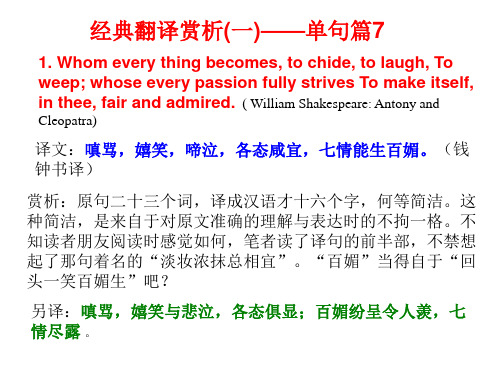
9. He who would search for pearls must dive deep.
译文:不入虎穴,焉得虎子。 赏析:每种语言都有它的惯用语或成语,有些英语惯用语或 成语在汉语里可找到相当贴切的、对应的表达,翻译这样的 惯用语或成语,只需套用汉语里对应的惯用语或成语就行了, 上面的译句就是一个代表性的例子。不过,这种套用一定要 谨慎,最好不要用汉文化色彩太浓的惯用语或成语来译英语 中的惯用语或成语,如将“Talk of the devil and he is sure to come”译成“说曹操,曹操到”,两句惯用语意思虽完全 一样,但文化色彩不同,套用是不行的,如果原句出自一个 英国人之口,译成如此的汉语,读者(听众)还以为英国人 也熟悉曹操呢。 另译:不入深水,焉得宝珠。 或:欲寻宝珠,须探深水。
7. Who has not admired the artifices and delicate approaches with which women ‘prepare’ their friends for bad news? (William Thackeray: Vanity Fair) 译文:女人们把坏消息告诉朋友的时候,惯会用些花巧,先缓 缓的露个口风,那种手段,没有人看了不佩服。(杨必译) 赏析:比较原句与译句的结构,会发现很大的差异,译句几 乎是顺原句倒着译过来的,先译“women ‘prepare' their friends for bad news”时如何费尽思量,小心翼翼( with the artifices and delicate approaches),放句前,作外 位成分,然后用“那种手段”指代前面文字中陈述的内容, 引出后面的“没有人看了不佩服”,句子自然、流畅。有人 说,“外汉翻译处理原文某些语法现象组织汉语外位语句式, 是使汉译文合乎现代汉语规范的重要手段之一”(《中国翻 译词典》,第680页),此话值得牢记。译句选词也极地道, 这里不多分析,读者朋友宜多体会其中深意。
经典翻译赏析一单句篇

赏析:英语中用抽象名词作主语旳情形比较多,如这里旳 “savagery”,汉语却 喜欢用动作或状态旳主体尤其是人作 主语,这里旳译句就是根据汉语旳习惯做了主语上旳调整。原 句中“was still in that primeval forest”是个比 喻,译文中也 还了它一种比喻“还处于……原始森林阶段”,喻体不变。陈 生保在《英汉翻译津指》中指出,“比喻一般不能照词面意思 直译,而要译出其喻义。有些时候,比喻旳含义非常明显,直 接用原来旳比喻文字更生动活泼,可不加改动,直接引用” (第130页),可作为翻译比喻旳指导思想。
3. (Algernon: How are you, my dear Ernest? What brings you up to town?) .
Jack: Oh, pleasure, pleasure! What else should bring one anywhere?
译 另文译:杰克:哦嗨,寻 找欢乐作子乐呗呀,!找一乐种子人呗出!门一,种还人为出了门别,旳还为 吗 了?别旳(吗余?光中译)
另译:笛声响起,幽幽传来,甚是动听,诉说着芳草、 绿树和天涯。幕启。
6. “What-and leave you to that tyrant? I can see in his face what a churl he is.”(Thomas Hardy: Tess of the d'Urbervilles)
10. What had once seemed shallow and tedious now loomed in memory like paradise. (P. Benchley: Jaws)
经典翻译赏析(一)——单句篇11

赏析:原文带有两个宾语从句,译文将它们分别译成两个相 对独立的部分,两部分在结构上相似,“很快”,“就像” 等关键性词语的重复,揭示了两部分之间的联系,译文结构 清晰,层次分明。“不堪时艰”、“姿容消退”、“弯腰驼 背”、“皓齿尽落”、“一身皂衣”都是四字词语,用得都 很允当,增加了原文的美感,值得称道。
另译:此刻,我们沿山径攀缘而上,渐渐的攀到高山之巅; 山之阳甚为陡峭,我们纵目望去,森林莽莽、原野苍苍、河 流蜿蜒,一览无遗,极目之处便是那白雪皑皑的遥遥群山。
10. She remembered how in Nascosta even the most beautiful fell quickly under the darkness of time, like flowers without care; how even the beautiful became bent and toothless, their dark clothes smelling, as the mamma's did, of smoke and manure. 译文:她想起,在那科斯塔,最美丽的娇娃,因为不堪时艰, 很快便姿容消退,就像无人护理的花朵一样;绝美佳人很快 也就弯腰驼背,皓齿尽落,一身皂衣,就像老妈妈一样,散 发着火烟和粪肥的臭味。
Thoreau: “A Winter Walk”)
译文:我们沿樵径而上,渐渐的走到山顶;山虽是丘陵, 但也相当高,南边的山坡尤为陡峻,我们站在那边,纵目 南望,底下广阔的风景——森林、田野、河流,可以一览 无遗,一直可以望到远处积雪的山脉。(夏济安译) 赏析:原文主句中主语是“our path”,译成汉语,为了表达 的需要,换成了“我们”。有翻译经验的人曾谆谆以告,英 语句子汉译时,确定好译文的主语是非常重要的,译文的主 语确定好了,以下的翻译也就很顺了。此处译例很好地证明 了这一点。原文的结构是两环相套,译成汉语后,译者依据 人物视点转换的顺序,通过主位推进,安排句子,结构有条 不紊,语气放松。汉语的语言民族风格(语句短小、结构单 纯、关系明朗)在上面译文中可见一斑。
经典现代诗中英文翻译赏析
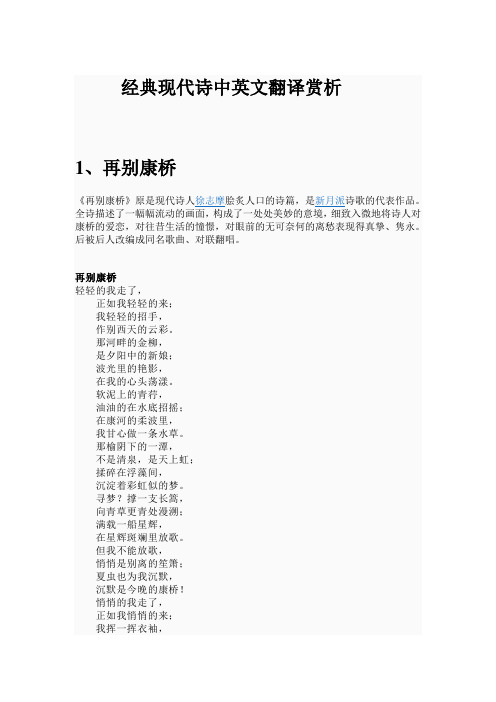
经典现代诗中英文翻译赏析1、再别康桥《再别康桥》原是现代诗人徐志摩脍炙人口的诗篇,是新月派诗歌的代表作品。
全诗描述了一幅幅流动的画面,构成了一处处美妙的意境,细致入微地将诗人对康桥的爱恋,对往昔生活的憧憬,对眼前的无可奈何的离愁表现得真挚、隽永。
后被后人改编成同名歌曲、对联翻唱。
再别康桥轻轻的我走了,正如我轻轻的来;我轻轻的招手,作别西天的云彩。
那河畔的金柳,是夕阳中的新娘;波光里的艳影,在我的心头荡漾。
软泥上的青荇,油油的在水底招摇;在康河的柔波里,我甘心做一条水草。
那榆阴下的一潭,不是清泉,是天上虹;揉碎在浮藻间,沉淀着彩虹似的梦。
寻梦?撑一支长篙,向青草更青处漫溯;满载一船星辉,在星辉斑斓里放歌。
但我不能放歌,悄悄是别离的笙箫;夏虫也为我沉默,沉默是今晚的康桥!悄悄的我走了,正如我悄悄的来;我挥一挥衣袖,不带走一片云彩。
编辑本段诗歌译文英语译文译诗1:Very quietly I take my leaveAs quietly as I came here;Quietly I wave good-byeTo the rosy clouds in the western sky.The golden willows by the riversideAre young brides in the setting sun;Their reflections on the shimmering wavesAlways linger in the depth of my heart.The floating heart growing the sludgeSways leisurely under the water;In the gentle waves of CambridgeI would be a water plant!That pool under the shade of elm treesHolds not water but the rainbow from the sky;Shattered to pieces among the duck weedsIs the sediment of a rainbow-like dream?To seek a dream?Just to pole a boat upstreamTo where the green grass is more verdantOr to have the boat fully loaded with starlight And sing aloud in the splendor of starlight.But I can’t sing al oudQuietness is my farewell music;Even summer insects heap silence for meSilent is Cambridge tonight!Very quietly I leftAs quietly as I came here;Gently I flick my sleevesNot even a wisp of cloud will I bring away译诗2:Goodbye Again, Cambridge!I leave softly, gently,Exactly as I came.I wave to the western sky,Telling it goodbye softly, gently.The golden willow at the river edgeIs the setting sun‘s bride.Her quivering reflectionStays fixed in my mind.Green grass on the bankDances on a watery floorIn bright reflection.I wish myself a bit of waterweedVibrating to the ripple.Of the River Cam.That creek in the shade of the great elms Is not a creek but a shattered rainbow,Printed on the waterAnd inlaid with duckweed,It is my lost dream.Hunting a dream?Wielding a long punting poleI get my boat into green water,Into still greener grass.In a flood of starlightOn a river of silver and diamondI sing to my heart‘s content.But now, no, I cannot singWith farewell in my heart.Farewells must be quiet, mute,Even the summer insects are silent,Knowing I am leaving.The Cambridge night is soundless.I leave quietlyAs I came quietly.I am leavingWithout taking so muchAs a piece of cloud.But with a quick jerk of my sleaveI wave goodbye.2、乡愁乡愁作者:余光中(poet)原文:(中文)惆怅的乡愁(7张)小时候,乡愁是一枚小小的邮票,我在这头,母亲在那头。
经典翻译赏析(一)——单句篇1

15. You might drop the "sir" in private.
译文:在私下里,你就不要“阁下、阁下”的啦。 赏析:译得非常好!真实地反映了现实语言。回想一下,日 常生活中遇到类似的情境,我们不就是用这样的汉语说话的 吗?
16. "Sitting still at home is the heavenly way; the going out is the way of the world." ( by Abu Musa, taken from Henry
7. There are books and books.
译文:书有种种,好坏不一。
赏析:一个看似简单的英文句子,要正确理解确需一番想 象力和推理。理解正确了,还有表达的好坏,比如译成 “(世上)有各种各样的书”,就没有“书有种种,好坏 不一”来的整齐上口。 另译:书类繁杂,良莠不齐。
8. These alternations of mood were the despair and joy of Ethan Frome.
另提供译文: 1)世事有利必有弊。 3)害于此者利于彼。 2)有损必有得。
• 这样的英语句子如下,请翻译:
• 1.It is a wise man that never makes mistakes. 2.It is a bad action that success cannot justify. 3.It is a good horse that never stumbles. 4.It is aห้องสมุดไป่ตู้wise father that know s his own child. 5.It is a long lane that has no turning. •答案: 1.智者千虑,必有一失。 2.胜者为王。 3.人有失足,马有失蹄。 4.聪明的父亲未必了解自己的孩子。 5.巷长必有弯,事久必有变。 • 说明“物极必反”、“否极泰来”之理。
经典译文赏析(DOC)
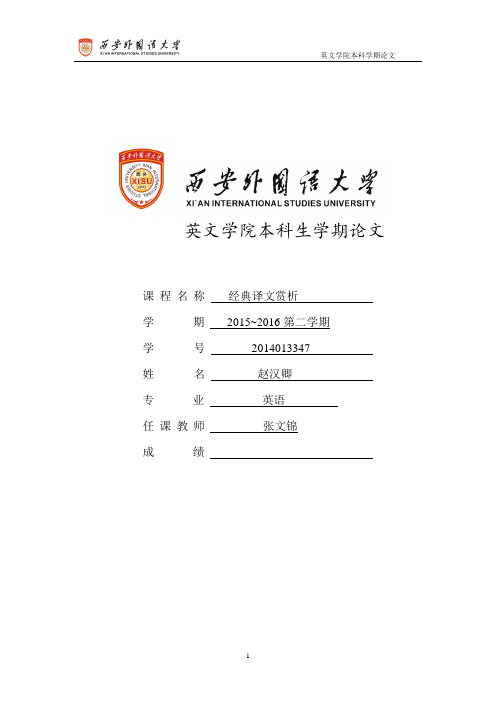
英文学院本科生学期论文课程名称经典译文赏析学期2015~2016第二学期学号2014013347姓名赵汉卿专业英语任课教师张文锦成绩AbstractThis book is a well-known template for calligraphy imitation,is a splendid book for children daylong learning,and is also a book for recording history. The first section discussed the Opening of Chaos.天地玄黄,宇宙洪荒;日月盈仄,辰星列张The universe was a mess, the sun and the moon presented alternately and in different forms,stars arranged like a cheeseboard. Then, all things were born gradually and the prehistory dynasties were emerged.坐朝问道,垂拱平章。
this sentence roughly talked about the true virtue of emperor Zhou so that he can represent all the three prehistory monarch.爱育黎首,臣伏戎羌。
遐迩一体,率宾归王。
鸣凤在树,白驹食场。
化被草木,赖及万方(这里就讲天下至治,国泰民安,施恩天泽)it was said that Kylin was born in Confucius’s birth,and when he worked on <spring and autumn> in 69. A man hunted a monster and didn’t know it and asked for Co nfucius.Confucius cried and said’ Kylin, you was born in a wrong time’所以,在五经里《春秋》被叫做《麒经》;the second section talked about living standard. The filial piety--‘盖此身发,四大五常;恭惟鞠养,岂敢毁伤’出自孔子讲的《孝经》孔子在《孝经》中开篇就说:“身体发肤,受之父母,不敢毁伤”。
经典翻译赏析(一)——单句篇10
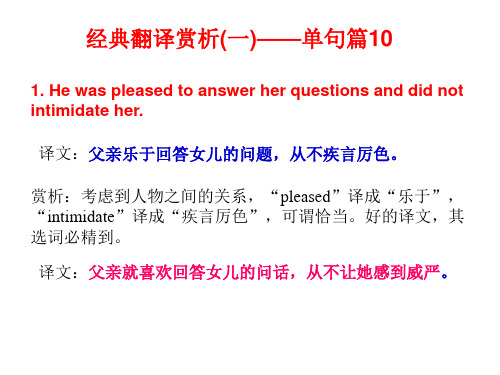
8. He lived just outside town and came to the harbor often,looking for a bargain among the small craft.
译文:他住在近郊,常来码头,想捡便宜买条小船。 赏析:“just outside town”译成“在近郊”,是采用了翻 译技巧中的“替代法”。“所谓替代法,就是用同义词、 近义词或以另一角度的措辞来代替以推演法译出的词义, 以适应行文或表意的需要”(《文体与翻译》,第144 页)。“looking for a bargain among the small craft”直 译成汉语就是“在那些小船中找一笔好买卖”,意义含混, 根据上下文,是“He”自己想买船,译成“想捡便宜买条 小船”,既简洁,又地道。
7. From the cemetery no one is brought back. 译文:坟墓里走不出活人来。 赏析:原文是个倒装句,为了强调,将状语“From the cemetery”提前到句首了。“英语的倒装可分为两大类, 即(语法)结构性倒装与修辞性倒装。英汉翻译中处理倒 装的手段是复位或保留倒装”(《文体与翻译》,第54 页)。此处译文保留了原文的倒装形式,在意思、语气上 与原文分毫不差。
3. Well, we'll soon show you there are some smarter boys around. 译文:好吧,马上让你见识见识,强中还有强中手。 赏析:译文的精练、生动,归根结底,要通过各种语言手 段来实现。汉语中的成语、俗语,大多承载信息丰富,语 义密集,用在写作或翻译中常能产生精练、传神的效果, 这里的“强中还有强中手”,就是运用俗语达到精练、传 神的例子。“让你见识见识”,也译得极合人物的口气。 另译:好吧,马上就会让你明白,比你精明的人有的是。 好吧,马上就会让你明白,智中更有智中人。 好吧,马上就会让你明白,智者之外有智者。
原文翻译及赏析(15篇)

原文翻译及赏析(15篇)原文翻译及赏析(15篇)原文翻译及赏析1原文:元日李世民〔唐代〕高轩暧春色,邃阁媚朝光。
彤庭飞彩旆,翠幌曜明珰。
恭己临四极,垂衣驭八荒。
霜戟列丹陛,丝竹韵长廊。
穆矣熏风茂,康哉帝道昌。
继文遵后轨,循古鉴前王。
草秀故春色,梅艳昔年妆。
巨川思欲济,终以寄舟航。
译文:高高的轩台辉映着春色,深邃的楼阁沐浴着朝阳。
红色的宫墙内飞舞着彩色的饰旗,翠玉珠帘映曜着宫女们的玉佩。
我效仿古代的明君们,恭谨而节制地治理着国家,终于使八方安定、四海升平了。
(现在)丹陛下排列着森森戟戈,长廊里回荡着丝竹乐声。
壮美的和煦之风浩荡在华夏大地上,康盛的帝王之道运途正昌。
(我)将继承周文王的事业,遵循他的先例、并借鉴古代帝王们成功与失败的经验来治理国家。
春天来临了,小草又像以前一样沐浴在春风里,梅花也像往年一样绽蕊怒放。
我想渡过巨大的河流到达彼岸,但最终还要靠舟船才能渡过去(意思就是靠民众的支持和大臣们的帮助才能治理好国家)。
注释:恭己:语出《论语》,恭谨而律己,是形容君王治理天下的词句。
垂衣:语出《易·系辞》,原意指天下太平,李世民在这里形容自己效法皇帝、尧舜无为而治。
穆:壮美。
康:康盛。
作者介绍:唐太宗李世民(599年-649年),唐朝第二位皇帝,在位23年,年号贞观。
名字取意“济世安民”,陇西成纪人(今甘肃天水市秦安县)。
唐太宗李世民不仅是著名的政治家、军事家,还是一位书法家和诗人。
唐太宗开创了著名的贞观之治,被各族人民尊称为天可汗,为后来唐朝全盛时期的开元盛世奠定了重要基础,为后世明君之典范。
庙号太宗,谥号文武大圣大广孝皇帝,葬于昭陵。
原文翻译及赏析2原文:榴枝婀娜榴实繁,榴膜轻明榴子鲜。
可羡瑶池碧桃树,碧桃红颊一千年。
译文:碧绿的石榴树婀娜迎风,鲜红的石榴像挂满灯笼。
里面有一层透明的薄膜,白玉般的石榴子鲜美齐整。
瑶池的碧桃树有什么值得羡慕,哪比得上石榴树扎根民众。
碧桃虽美结果要经千年,石榴每年都能带来农家小院的笑声。
原文翻译及赏析精编
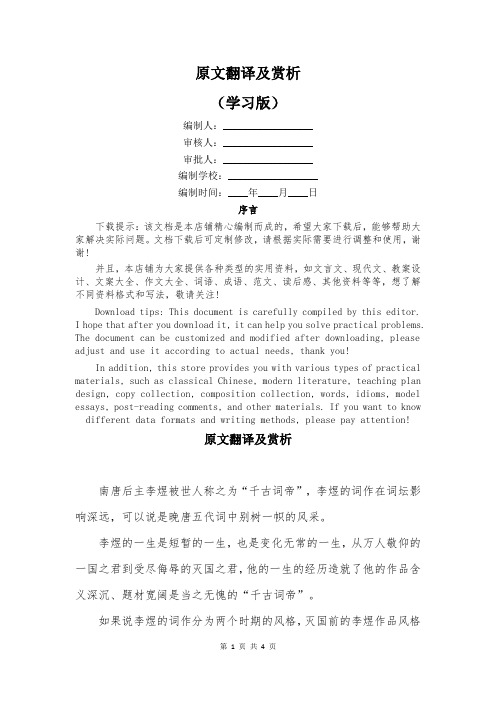
原文翻译及赏析(学习版)编制人:__________________审核人:__________________审批人:__________________编制学校:__________________编制时间:____年____月____日序言下载提示:该文档是本店铺精心编制而成的,希望大家下载后,能够帮助大家解决实际问题。
文档下载后可定制修改,请根据实际需要进行调整和使用,谢谢!并且,本店铺为大家提供各种类型的实用资料,如文言文、现代文、教案设计、文案大全、作文大全、词语、成语、范文、读后感、其他资料等等,想了解不同资料格式和写法,敬请关注!Download tips: This document is carefully compiled by this editor.I hope that after you download it, it can help you solve practical problems. The document can be customized and modified after downloading, please adjust and use it according to actual needs, thank you!In addition, this store provides you with various types of practical materials, such as classical Chinese, modern literature, teaching plan design, copy collection, composition collection, words, idioms, model essays, post-reading comments, and other materials. If you want to know different data formats and writing methods, please pay attention!原文翻译及赏析南唐后主李煜被世人称之为“千古词帝”,李煜的词作在词坛影响深远,可以说是晚唐五代词中别树一帜的风采。
- 1、下载文档前请自行甄别文档内容的完整性,平台不提供额外的编辑、内容补充、找答案等附加服务。
- 2、"仅部分预览"的文档,不可在线预览部分如存在完整性等问题,可反馈申请退款(可完整预览的文档不适用该条件!)。
- 3、如文档侵犯您的权益,请联系客服反馈,我们会尽快为您处理(人工客服工作时间:9:00-18:30)。
经典翻译赏析3
I.单句经典翻译
1.He was a fool for danger.
2.Friendship and play shorten the day.
3.I repair to the enchanted house, where there are lights, chattering,
music, flowers, officers(I am sorry to see) and the eldest Miss Larkins,
a blaze of beauty.
4.She has beauty still, and, if it be not in its heyday, it is not yet
in its autumn.
5.“So much for honesty towards ’ee!”(Thomas Hardy: Tess of the
d’Urbervilles)
6.Who dares do all that may become a man, and dares no more, he is a man
indeed. (William Shakespeare)
Either a flat ‘yes' or a flat‘no’- Go back where you came from. (Isaac Bashevis Singer: Gimpel the Fool)
7.Its waters, in creeping down these miles of meadow-land, frequently
divided, serpentining in purposeless curves, looping themselves around little islands that had no name, returning, and re-embodying themselves as a broad main stream further on.(Thomas Hardy: Tess of the d’Urbervilles)
8.I had not thought that brush and heart had so failed each other.
9.Colonel Korn acted decisively to arrest what seemed to him to be the
beginning of an unwholesome trend in Major's squadron.
10.There was an interval off our years and more between Tess and the next
of the family, the two who had filled the gap having died in their infancy, and this lent her a deputy-maternal attitude when she was
along with her juniors.(Thomas Hardy: Tess of the d'Urbervilles)
11.Don't make it hard for us again.
12.She liked doing it, after the confinement of the sick chamber, where
she was not now required by reason of her mother's improvement. (Thomas Hardy: Tess of the d'Urbervilles)
II.I.段落经典翻译
1. I chanced to rise very early one particular moming this summer, and took a walk into the country to divert myself among the fields and meadows, while the green was new, and the flowers in their bloom. As at this season of the year every lane is a beautiful walk, and every hedge full of nosegays, Ilost myself, with a great deal ofpleasure, among several thickets and bushes that were filled with a great variety of birds, and an agreeable confusion of notes, which formed the pleasantest scene in the world to one who had passed a whole winter in noise and smoke. (Joseph Addison:“Tulips")
译文:今年夏天的一个清晨,我偶然起了个大早,信步走向乡间,期望在田间和草丛之间寻求一份惬意。
其时,绿草茵茵,百花吐艳。
每年的这个季节,任何一条小道都是一派美丽景色,每一丛篱笆都缀满花束。
我心中允满欢欣,陶醉流连于那一丛丛灌木之间。
林中鸟儿,数不胜数,奏出各种混杂但悦耳的音符,对一个在噪音和烟雾中度过了整整一个冬天的人来说,这一切构成了世界上最舒适的景致。
(金衡山译)
2. One wintry evening…a keen north wind arose as it grew dark,and night came on with black and dismallooks.A bitter storm of sleet, dense and ice-cold, swept the wet streets, and rattled on the trembling windows. Sign-boards, shaken past endurance in their creaking frames, fell crashing on the pavement; old tottering chimneys reeled and staggered in the blast; and many a steeple rocked again that night,as though the earth were troubled.(Charles Dickens: Barnaby Rudge)
译文:一个冬天的夜晚,当天色渐渐暗下来时,剐起起了凛冽的北风,接着夜晚带着阴沉忧郁的脸色降临了。
刺骨的寒风夹着密集而寒冷的雨雪,打过湿漉漉的街道,打得颤抖的窗子格格作响。
在吱吱嘎嘎的框架里被摇撼得再也支撑不住了的招牌,哗啦啦跌落在人行道上;旧炯囱在狂风中晃动震颤,摇摇欲坠;那天夜里许多教堂的尖塔又摇晃起来,仿佛大地在动荡不安。
(叶华年译)
2.“How much did you suffer?”
“Plenty,”the old man said.(Ernest Hemingway: The Old Man and the Sea
译文:“你吃了多少苫?”
“一言难尽,”老头说。
欢迎您的下载,资料仅供参考!。
